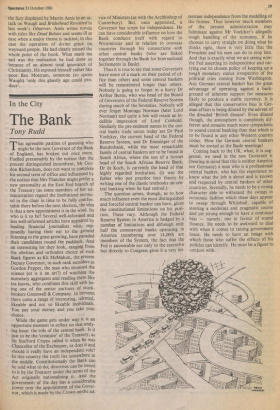In the City
The Bank
Tony Rudd
That agreeable pastime of guessing who 1 might be the next Governor of the Bank of England, has broken out once more. Fuelled presumably by the notion that the present distinguished incumbent, Mr Gordon Richardson, does not want to complete his second term of office and influenced by the notion that Mrs Thatcher might prefer a new personality at the East End branch of the Treasury (as some members of her administration regard the institution) esconced in the chair in time to be fully comfortable there before the next election, the idea is that a new appointment is in the wind. So who is it to be? Several well-informed and less well-informed articles have appeared by leading financial journalists who, supposedly having their ear to the ground listening to the grass growing, have paraded their candidates round the paddock. And an interesting lot they look, ranging from the obvious and orthodox choice of such Bank figures as Kit McMahon, the present Deputy Governor, to such rank outsiders as Gordon Pepper, the man who invented the science (or is it an art?) of watching the monetary aggregates and reading them like tea leaves, who combines this skill with being one of the senior partners of stockbrokers Greenwell & Company. In between there come a range of interesting, talented, likeable and not so likeable individuals. You pay your money and you take Your choice.
While the game gets under way it is an opportune moment to reflect on that undying issue: the role of the central bank. Is it Just to be the 'creature' of the Treasury, as Sir Stafford Cripps called it when he was Chancellor of the Exchequer, or does it and should it really have an independent role? In this country the truth lies somewhere in the middle. Constitutionally the Bank can be told what to do; directives can be issued to it by the Treasury under the terms of the Act originally nationalising it. And the government of the day has a considerable power over the appointment of the Governor, which is made by the Crown on the ad vice of Ministers (as with the Archbishop of Canterbury). But, once appointed, a Governor has scope for independence. He can have considerable influence on how the Bank conducts itself with regard to Westminster and in relation to overseas countries through his connections -with other central banks (who are linked together through the Bank for International Settlements in Basle).
Thus it is true to say that some Governors leave more of a mark on their period of office than others and some central bankers will be remembered longer than others. Nobody is going to forget in a hurry Dr Arthur Burns, who was head of the Board of Governors of the Federal Reserve System during much of the Seventies. Nobody will ever forget Montagu Norman (later Lord Norman) and quite a feW will retain an indelible impression of Lord Cobbold. Similarly the pre-eminent names in the central banks trade union today are Dr Paul Voelcker, the current head of the Federal Reserve System, and Dr Emminger of the Bundesbank, while the most remarkable family of central bankers are to be found in South Africa, where the son of a former head of the South African Reserve Bank, Dr de Koch, is currently the head of that highly regarded institution. (It was the father who put practice into theory by writing one of the classic textbooks on central banking when he had retired.) The question arises, though, as to how much influence even the most distinguished and forceful central banker can have, given the constitutional limitations on his position. These vary. Although the Federal Reserve System in America is hedged by a number of limitations and although only half the commercial banks operating in America (numbering over 14,000) are members of the System, the fact that the Fed is answerable not only to the executive but directly to Congress gives it a very im portant independence from the meddling of the former. Thus however much members of the present administration may fulminate against Mr Voelcker's allegedly tough handling of the economy, if he chooses to carry straight on doing what he thinks right, there is very little that the President and his men can do to stop him. And that is exactly what we are seeing now: the Fed asserting its independence and carrying out its chosen policy of keeping up a tough monetary stance irrespective of the political cries coming from Washington. Any German central banker has the great advantage of operating against a background of inherent support for measures likely to produce a stable currency. It is alleged that this conservative bias in German affairs is being diluted by the advent of the dreaded 'British disease'. Even diluted though, the atmosphere is completely different and remains much more sympathetic to sound central banking than that which is to be found in any other Western country today. How the German central bankers must be envied at the Basle meetings!
Coming back to the UK, what, it is suggested, we need in the new Governor is (bearing in mind that this is neither America nor Germany) a man who is a professional central banker, who has the experience to know what the job is about and is known and respected by central bankers of other countries. Secondly, he needs to be a strong character able to withstand the swings in economic fashion which these days appear to sweep through Whitehall, capable of steering a moderate and pragmatic course and yet strong enough to have a continual bias — namely, one in favour of sound finance. He needs to be awkward to deal with when it comes to raising government loans. He needs to have an image with which those who suffer the effects of his policies can identify. He must be a figure to conjure with.






































 Previous page
Previous page